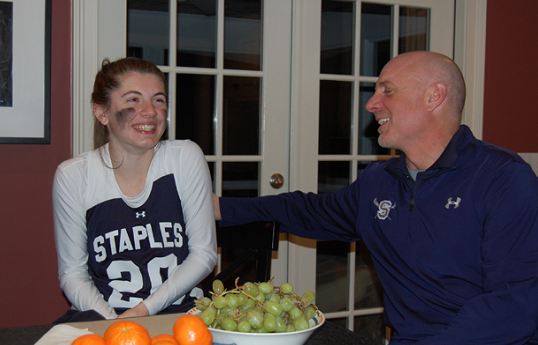
Just as players belong on the field, parents are forever confined to the bleachers. Right?
Wrong.
In some cases, parents are the ones on the sidelines screaming commands at the players. Sometimes, the parents are the coaches.
This year, Pete Najarian, father of Staples girls’ lacrosse player Nicki Najarian ’15, is head coach for the girls’ varsity lacrosse team.
“I think this season will be a good year to get the program headed in the right direction, and I think him being coach will help that happen,” Nicki said about her father.
Ross Whelan ’13, a player on the boys’ varsity basketball team, is in the same boat. Ross’s father, Tom Whelan, is his assistant coach.
“[I enjoy] him always being there when I need him, whether it’s at home or on the court,” Ross said regarding his father.
According to Athletic Director Marty Lisevick, it is rare that a parent coaches a team that their child plays on. Besides the aforementioned pairs, the only other times in which this has occurred has been with Laddie Lawrence coaching his son in track and Tom Wall coaching his daughters in softball.
Before finalizing a coaching position, Lisevick goes to the captains of the respective program. Lisevick has seen that captains are thrilled to have both a great coach and a great athlete on their team.
Although their relationships are different than other coach-player relationships, all agree that they are able to put their father-child relationship on hold during practices and games.
“I would say it’s just another person to give you advice or to run something by when you’re at practice or during a game,” Ross said.
Ross’s teammate, Nick Ward ’14, agrees that on the court, Ross is just another player and Ross’s father is just another coach.
“He treats everyone the same,” Ward said. “You often see parents who coach their children and treat their kids better than the rest of the team, but not Mr. Whelan.” Ward recalls that when he was younger, he often had coaches who were parents of the team members, and they would end up receiving partial treatment.
Emma Boland ’15, a player on the girls’ varsity lacrosse team, sees that the relationship between Nicki and her father as coach and player has not caused any conflict on the team.
“On the field, I don’t even think of Nicki and her dad as father and daughter,” Boland said. “Mr. Najarian is just the coach and Nicki is just another player on the team.”
Yet Nicki does feel that their relationship could potentially, at times, be detrimental to their coach to player relationship.
“I think we would mostly fight about if he’s pushing me too far because it’s always going to be his instinct as my dad to push me to my limit,” Nicki said.
Pete and Tom agree that being able to distinguish between the right time to act as a coach and the right time to just be a parent is crucial.
Pete wants to act solely as a parent in the house and a coach on the field. For example, he will make sure that he doesn’t get hung up on talking too much about lacrosse when he and Nicki are at home.
Tom agrees that is important to establish different roles in different settings, alternating between being Ross’s coach and being his parent.
“I try not to be the coach for Ross at home and do not parent Ross on the court,” Tom said. “I try to develop a clear separation of roles.”













































